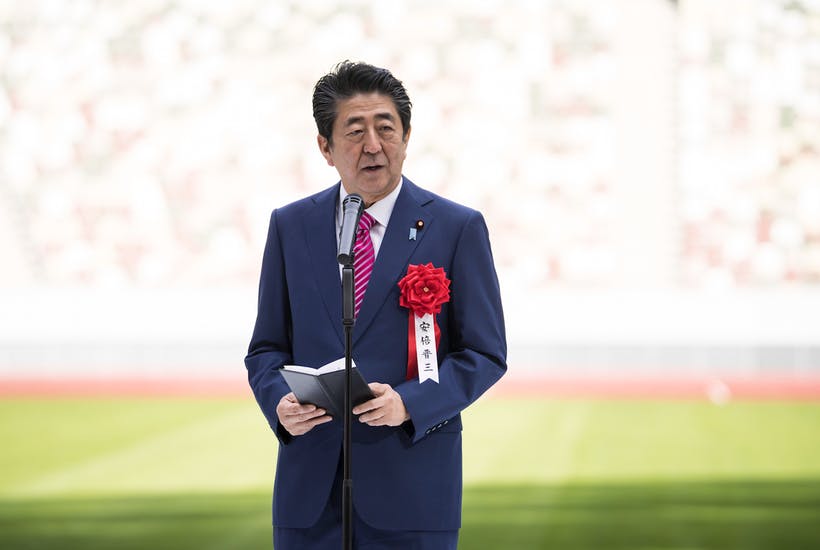The Japanese are fond of poeticising the fleeting beauty of the cherry blossom season, which no sooner reaches its full glory than is gone, leaving behind nothing but bare branches, scattered petals, and a sense of wistful regret and nostalgic yearning.
It’s the theme of countless haikus and mournful folk ballads.
But if the cherry blossoms themselves soon vanish, the cherry blossom party scandal, currently vexing prime minister Shinzo Abe, is proving as worryingly hard to remove as Japanese knotweed.
It’s in danger of turning into a Japanese version of Watergate.
The annual prime minster’s cherry blossom viewing party is a tradition going back to 1952. Public funds are used to support the event which customarily sees around 10,000 distinguished political, business and cultural luminaries invited to mingle in the idyllic shade of Shinjuku-Gyoen park, partaking of sweets and light refreshments.
Until recent years the event was an uncontroversial, unremarked upon fixture in the calendar, with as much extra-political significance as a Queen’s garden party. It was a chance for Tokyo’s elite to unwind, to see and be seen in a neutral setting, and possibly to take home a trophy photo with the PM – but emphatically not for serious politicking.
However the 2019 edition was somewhat different. It has been alleged that Abe used the event as a way of currying favour with potential supporters of his Liberal Democratic party by handpicking the guest list (abetted by his ever unhelpful wife Akie). A pre-party dinner at the posh New Otani Hotel, for which guests were charged a suspiciously low fee of only 5,000 yen (£35), has added to the sense of dubiousness.
The scandal has been compounded by the government’s response to requests by the opposition to see the guest list. Cabinet secretary, and the second most powerful man in the Japanese government, Yoshihide Suga claimed it had been shredded on the very day it had been requested – despite the law being that government’s documents should be kept for at least a year.
The affair looks set to feature heavily in proceedings of the new session of the Japanese Diet, which has just opened. The latest developments are the ‘reprimanding’ of a group of civil servants connected to the handling of the guest list, whose careers are now heading for the shredder too. The move, seen as buck-passing by many, prompted calls by the opposition parties for the dismissal of Suga.
All this makes it hard to believe that it was only last November that saw Shinzo Abe riding high, having become the longest-serving Japanese prime minister in history. There was confident talk of a snap election of the Japanese Lower House in early 2020 aimed at cementing his authority and giving him the mandate to proceed with his long-cherished ambition of making substantial revisions to Japan’s pacifist constitution.
Such plans are now on hold, and the latest word is that Abe will wait until after the hopefully (fingers crossed) successful Olympics and Paralympics in August, by which time he must be banking on the cherry blossom scandal finally being forgotten in the heady afterglow of Olympic induced national euphoria.
But that may be wishful thinking. It feels like for Abe, his luck is finally starting to run out. He had begun to acquire an aura of invincibility after he survived unscathed from a murky deal involving a kindergarten with whom his wife was closely associated that had somehow acquired large tracts of land at a knockdown price. This one looked serious, but somehow Abe survived and thrived.
But then along came the cherry blossom party. Over New Year, Abe was forced to retreat to the golf course to avoid the fall out from Carlos Ghosn’s escape, which may only be beginning. No senior political figures have been implicated in Ghosn’s conspiracy narrative, as yet, but there must be real nervousness among the elite about what the maverick businessman could allege if he so chose.
And only this week, yet another scandal has emerged when bribery allegations were made against a Liberal Democratic lawmaker from a Chinese firm hoping to cash in Abe’s governments plans to introduce casino resorts. The scandal has since metastasised and six officials are now under suspicion of taking bribes. The casino plan is on hold.
Abe is in danger of being overwhelmed, but it says something about the Japanese that compared to the serious financial allegations and shady business deals, it is the relatively mild sounding offence of tweaking a guest list of an unimportant garden party and treating potential supporters to a cut priced dinner that has fired the public imagination and caused most outrage.
In Japan, corruption is one thing. But a breach of etiquette and tradition, and an offence against the beauty of the sacred cherry blossoms? Quite another.






Comments